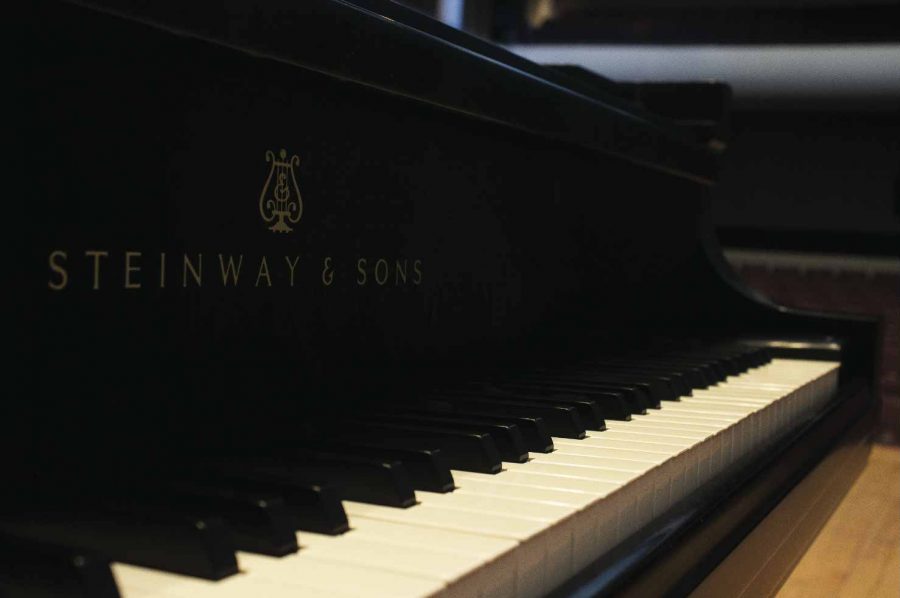As Christina Lewis, a freshman majoring in piano performance, played the Steinway & Sons piano in The University of Alabama’s concert hall Saturday, a smile grew on her lips. Timing was a challenge as she played the duet, but her fingers hit the last chord of the piece with a perfect attack. The sound rang and resonated through the hall perfectly. Lewis looked at her duet partner and stole a smile.
“There are definitely moments I’ve had on Steinways that I’ve never had on any other instrument,” Lewis said.
The UA School of Music started an initiative to become an All-Steinway school. This distinction requires that more than 90 percent of their pianos be Steinways, requiring about 85 pianos to be replaced, and roughly costing $3 million.
Being an All-Steinway school is a prestigious distinction, as only 150 schools claim the title. Steinways are the preferred piano for 98 percent of piano artists.
Kevin Chance, associate coordinator of keyboard studies, said Steinways are a lot more responsive to playing because of the detail and care that go into the mechanism that works the key depression. Every Steinway is handmade, giving it a reputation for high quality and high costs. Chance said a Steinway is more nuanced than other pianos, so it is more responsive to the differences in attack.
“To play a Steinway, the piano feels like an extension of you,” Chance said. “It felt as though the instrument was a part of me. Any sound that I wanted, any nuance, any shape the piano was able to create instantaneously. When the piano is that well-regulated and that well-voiced, it’s as though the piano becomes your voice.”
Pianists rely on the instrument they find at their venue, and sometimes have to adjust between instruments. By being an All-Steinway school, Chance said it would help ease these adjustments. Steinways are the preferred instrument in concert halls and competitions.
By offering such high quality instruments for students to use in their daily practices, they can learn more finesse about music and familiarize themselves with the style of piano found on stage. Chance said each Steinway has its own personality, so the more variety of them to practice on, the more experienced the musician will be.
“Just like meeting a new friend, we have to meet a new piano,” Chance said. “The idea is that as educators we want a seamless transition between the practice room, the studio and the stage.”
There are about 35 piano students in the department, but all students majoring in music are required to take a piano studies course. Instructors say the All-Steinway initiative will help with recruiting and retention rates. Skip Snead, director of the School of Music, said this makes a strong statement that the department is committed to quality.
“Obviously, being the comprehensive music program in the state Alabama, the School of Music serves as cultural leader for the entire state,” Snead said. “The quality of music school here is very important to the entire campus beyond just music majors because of the influence that it brings culturally and to the arts, and of course as we know, a strong arts and cultural community strengthens the business community and every aspect of the community.”
Cindy St. Clair, a third-year graduate student and doctoral candidate in piano performance, said it’s an exciting time to be a piano major because this shows the University is committed to them in the highest level. When playing a piano that she has to fight with to get the desired sound, she said it takes away from the music. With Steinway pianos, she said she can focus on the musicality of her performance.
“When you sit at a fine instrument that’s making beautiful sounds and you feel successful in what’s going on there, your confidence is only going to get greater as you perform,” St. Clair said. “Going on stage is a tough thing because you’re so vulnerable. So anything you can do that builds confidence and gives you confidence to feel secure about what’s going on is going to make your performance much more successful.”
The cost and duration of the initiative is variable. The School of Music announced its plans to become an All-Steinway school Saturday, and the plans are still being thought out at this point. The department will organize fundraisers, host concerts and search for donors to cover costs. Because the department is not clear on the models of pianos it will buy and a variety of other factors, the cost is variable.
Michelle Rosenberg, marketing support assistant for the School of Music, said it could take anywhere from one to three years to complete the initiative.
Steinway regulates the pianos be upheld to certain standards and will train the piano technicians in the proper maintenance. Steinway also advertises All-Steinway institutes, spreading the University’s image.
“It’s a relationship really with the company through the instrument,” Rosenberg said. “It’s a lifelong partnership. Steinway will very much be a part of the School of Music.”









